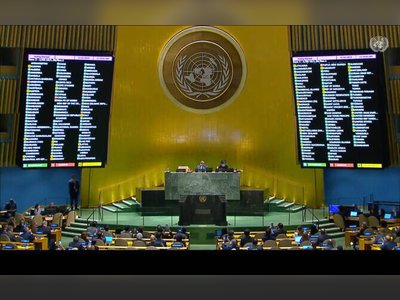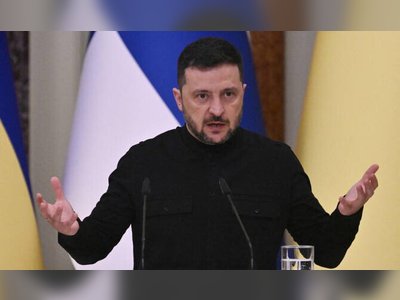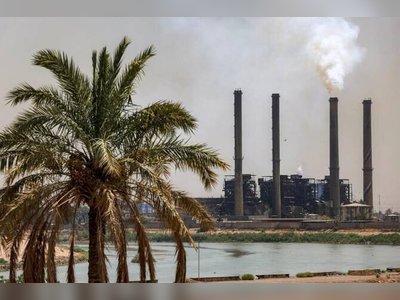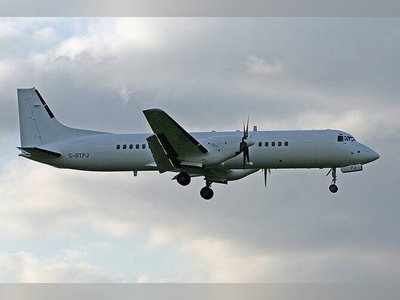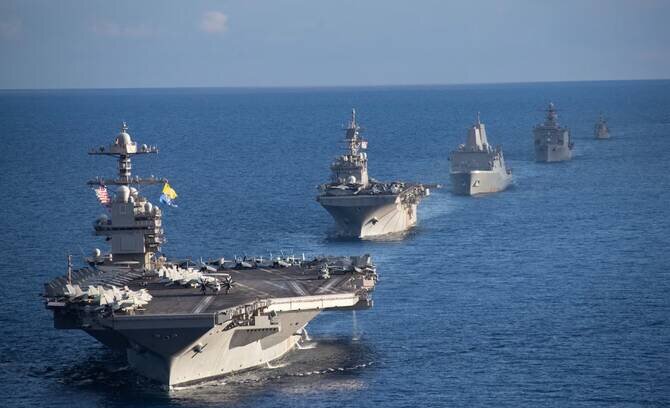
US Sends Aircraft Carrier to Latin America Amid Escalating Military Buildup
The deployment marks a significant increase in military presence in the region, sparking concerns and speculation about potential future actions.
The United States has announced the deployment of an aircraft carrier, the USS Gerald R.
Ford, along with its strike group to the waters off South America.
This move is part of a broader escalation and buildup of US military forces in the region, aimed at enhancing the country's capacity to counter illicit activities that threaten national security.
The Pentagon, under Defense Secretary Pete Hegseth, stated that this deployment will bolster efforts to detect, monitor, and disrupt activities by 'illicit actors' deemed as threats to US safety and prosperity.
The USS Ford is currently operating in the Mediterranean Sea with three destroyers; its journey to South America is expected to take several days.
This development marks a significant escalation of military power in an already tense region that has witnessed an unusually large US military presence in recent times, particularly around the Caribbean Sea and off the coast of Venezuela.
The deployment sends a strong message to countries in the region about aligning with US interests, according to analysts.
The Pentagon's operations in this region have been primarily focused on targeting drug trafficking activities, claiming that it is combating drug smuggling into the United States.
However, these actions have raised concerns and speculations about potential ulterior motives, particularly regarding Venezuela’s President Nicolás Maduro, who faces charges of narcoterrorism in the US.
Recent strikes conducted by the US military, notably against vessels operated by the Tren de Aragua gang, have increased in frequency.
The latest strike reported by Hegseth resulted in the deaths of at least six individuals, bringing the total death toll from these operations since early September to 43.
These strikes have expanded geographically, indicating a broader approach towards addressing drug trafficking issues.
The comparison between the current anti-drug efforts and the War on Terror has been made by Hegseth and others, suggesting a legal framework similar to that used post-9/11.
President Donald Trump has declared drug cartels as unlawful combatants, justifying the use of military force against them without seeking a formal declaration of war from Congress.
The deployment and subsequent actions have sparked concerns among lawmakers from both major political parties, who question the legal basis and potential escalation of these operations.
Some argue that it's about time such strong measures were taken against drug cartels, while others express fears of unintended consequences or long-term involvement in regional conflicts.
The situation highlights a complex interplay between national security interests, international relations, and the ongoing struggle against drug trafficking.
It remains to be seen how these developments will unfold and what implications they may have for both Latin American countries and global politics.
Ford, along with its strike group to the waters off South America.
This move is part of a broader escalation and buildup of US military forces in the region, aimed at enhancing the country's capacity to counter illicit activities that threaten national security.
The Pentagon, under Defense Secretary Pete Hegseth, stated that this deployment will bolster efforts to detect, monitor, and disrupt activities by 'illicit actors' deemed as threats to US safety and prosperity.
The USS Ford is currently operating in the Mediterranean Sea with three destroyers; its journey to South America is expected to take several days.
This development marks a significant escalation of military power in an already tense region that has witnessed an unusually large US military presence in recent times, particularly around the Caribbean Sea and off the coast of Venezuela.
The deployment sends a strong message to countries in the region about aligning with US interests, according to analysts.
The Pentagon's operations in this region have been primarily focused on targeting drug trafficking activities, claiming that it is combating drug smuggling into the United States.
However, these actions have raised concerns and speculations about potential ulterior motives, particularly regarding Venezuela’s President Nicolás Maduro, who faces charges of narcoterrorism in the US.
Recent strikes conducted by the US military, notably against vessels operated by the Tren de Aragua gang, have increased in frequency.
The latest strike reported by Hegseth resulted in the deaths of at least six individuals, bringing the total death toll from these operations since early September to 43.
These strikes have expanded geographically, indicating a broader approach towards addressing drug trafficking issues.
The comparison between the current anti-drug efforts and the War on Terror has been made by Hegseth and others, suggesting a legal framework similar to that used post-9/11.
President Donald Trump has declared drug cartels as unlawful combatants, justifying the use of military force against them without seeking a formal declaration of war from Congress.
The deployment and subsequent actions have sparked concerns among lawmakers from both major political parties, who question the legal basis and potential escalation of these operations.
Some argue that it's about time such strong measures were taken against drug cartels, while others express fears of unintended consequences or long-term involvement in regional conflicts.
The situation highlights a complex interplay between national security interests, international relations, and the ongoing struggle against drug trafficking.
It remains to be seen how these developments will unfold and what implications they may have for both Latin American countries and global politics.
